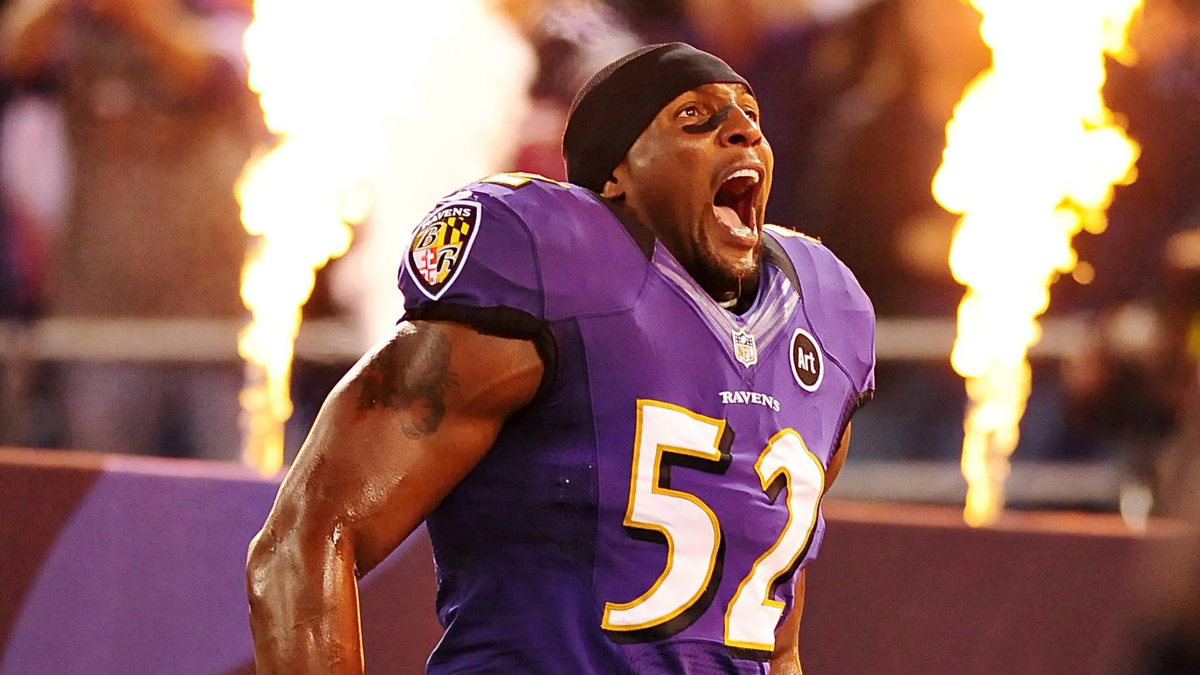

The first time Ray Lewis walked into a Baltimore Ravens locker room, he didn’t so much enter as erupt. It was 1996, the franchise’s inaugural year, born out of Cleveland’s ashes and introduced to a new city desperate for belonging. Lewis, just 21, walked in like he had something to prove. And he did. The world has long viewed Ray Lewis through extremes. But to reduce his journey to highlights and headlines is to miss the evolution entirely. His story is not just of a Hall of Famer. It is of a man who survived a difficult childhood, clawed his way out of a legal storm, redefined a franchise, and changed how the linebacker position would be measured forever.
Watch What’s Trending Now!
That truth, long buried beneath decades of football mythology, came rushing out on the night he was inducted into the Pro Football Hall of Fame. “My mama went broke again,” he told the crowd in Canton, voice cracking. “We had to make a move my 11th-grade year. My mama piled me up in a van. She said, ‘Let’s go. We’re going to Tennessee.’”
Born Ray Jenkins in 1975, Lewis was the eldest of five children raised primarily by his mother, Sunseria Jenkins. She was just 15 years old when he was born, navigating the impossible task of raising a large family with little support and no father figure in sight. Lewis himself would abandon the Jenkins surname in high school, choosing to adopt the last name of his mother’s boyfriend, Ray Lewis, as a mark of reclaiming identity amid the chaos.
ADVERTISEMENT
The family’s financial struggles were constant. Sunseria worked multiple jobs, but bankruptcy and broken homes followed them like shadows. At one point, the family packed into a van and moved to Tennessee, uprooting a high school junior at a critical time in his life. Lewis would later reveal that the move nearly ended his football dreams. “I fell on my knees one day, and I had given up because I knew my vision wasn’t in Tennessee, my vision was in Florida.
View this post on Instagram
His Hall of Fame induction speech laid bare the emotional core of his story. He recalled the night his mother handed him the bus ticket and the $20 in food stamps.“This is all I can do for you,” she told him at the time. And then he recalled the pain of leaving his younger brother behind, who begged him not to go. “My little brother grabbed me,” Lewis said. “You said to me, you can’t leave me. I won’t live without you.” But Lewis knew he had to go — for their sake. “What you didn’t know is that I would die to make my parents successful,” he declared.
ADVERTISEMENT
And it all came together in the end. “And now look, I told you we was going to make it. It’s not just me up here. It’s all of us up here,” he said. Sunseria’s tears that day were not for the fame or the rings, but for the boy she raised. It’s that version of Ray Lewis who shaped the man Baltimore came to know. That’s who showed up every Sunday in purple and black, pointing to the sky, carrying a city’s pride and his family’s hope in equal measure.
The gold jacket, the bust in Canton, the career stat lines—they’re all part of the record. But if you really saw Ray Lewis, if you covered him through the early years when Baltimore’s facilities still smelled of temporary beginnings and his voice hadn’t yet grown into its preacher cadence, then you know: the true measure of his greatness wasn’t what he did between the whistles.
ADVERTISEMENT
Ray Lewis became a face of legacy, faith & fire
January 31, 2000. Ray Lewis was 24, a two-time Pro Bowler, and the face of a young Ravens defense. That night, after a Super Bowl party in Atlanta, everything changed. By morning, two men were dead. Lewis and two friends were arrested. He was charged with murder.
The case became national news: a bloodied scene, a white suit that was never found, and a trial that blurred fact and spectacle. Lewis eventually pleaded guilty to obstruction of justice. He avoided jail but paid a price—financially, reputationally, and personally. To this day, opinions are split. Some believe he walked away with too little punishment. Others see a man caught in a situation he didn’t control.
ADVERTISEMENT
But what followed wasn’t a retreat. It was something else. Lewis came back to football more focused than ever. The same mouth that once barked signals on third-and-long now spoke about God, redemption, and second chances.
Top Stories
Mike Vrabel Threatens to Bench Locker Room for Super Bowl After Patriots Win vs Broncos

NFL Announces Punishment Decision for Josh Allen’s Bills Following Divisional Round Loss

Sean Payton’s Stern Statement on Jarrett Stidham’s Mistake After Assigning Blame for Broncos’ Loss

Jarrett Stidham Breaks Silence on Broncos Mistake After Controversial Incident vs Patriots

Adverse Conditions Force Travis Kelce-Patrick Mahomes’ Business Partnership to Close on Saturday

Years later, long after his last snap, Lewis sat down with Cigar Aficionado. It wasn’t about the case. It wasn’t really about football either. It was about purpose. He stripped the helmet away and called football “a platform to spread purpose” rather than the purpose itself. He likened each tackle to a sermon and every Super Bowl to a pulpit, insisting the gridiron was merely the loudest room in which he could speak about discipline, service, and, yes, his mother’s sacrifices.
View this post on Instagram
ADVERTISEMENT
Daily prayer and scripture study anchored his 17-season career, he explains, because “talent fades if spirit falters”. Even in the peak of Baltimore winters, he began his mornings with devotionals before weights. Faith guided him through locker-room conflicts and contract storms, giving context to the $39 ticket that launched everything. Fame became a megaphone; faith chose the words.
Post-retirement, Lewis channels that spiritual adrenaline into mentoring rookies, echoing the brother-protector role he shouted about onstage. He calls it “finishing the race”—making sure young athletes don’t just sign deals but also sign up for a purpose. The elder linebacker who once lifted teammates with pregame sermons now lifts boardroom protégés, teaching them that adversity is a tuition, not a toll.
While talking about wealth, Lewis laughs about being broke “multiple times,” which forged a ‘never again’ mindset that propels his ventures, from media to philanthropy. Scarcity became rocket fuel, proof that the bank balance isn’t a verdict but a variable. Each new business, each charity gala, is a rebuttal to that Tennessee detour—and a thank-you note to Ella’s food stamps.
ADVERTISEMENT
ADVERTISEMENT
ADVERTISEMENT
ADVERTISEMENT



